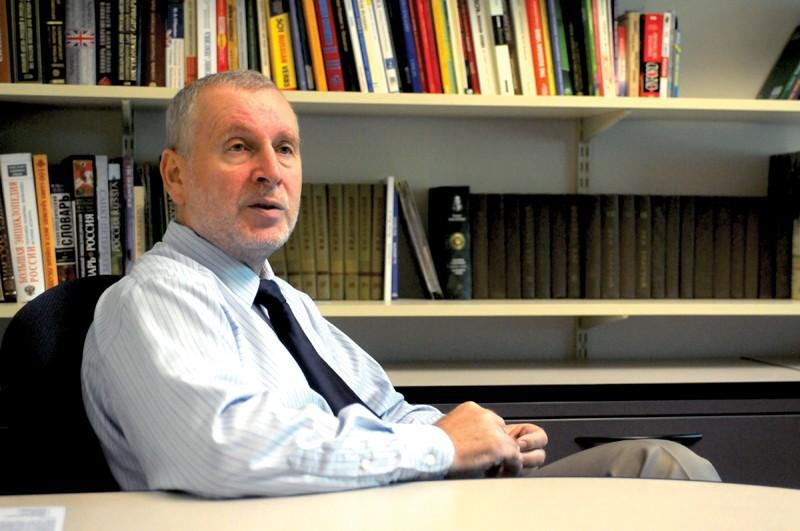Russian Studies undergoes changes

GVL / Robert Mathews Program Director of the Russian Studies program Svetoslav Pavlov.
Aug 26, 2012
With a new coordinator, new home and new curriculum, Grand Valley State University’s Russian studies program will withstand a number of changes for the 2012-2013 school year to serve its roughly 20 majors and minors.
Founded during the Cold War when the Soviet Union existed, Russian Studies is the oldest Area Studies program at GVSU. Its new coordinator, Professor Svetoslav Pavlov, said the program is ready for updates to reflect the political and geographical changes in Europe.
“There is a new reality, there is not a Soviet Union,” Pavlov said.
Part of the reconstruction process would then be to redefine Russian studies: should students examine only Russia or all the countries and cultures of the former Soviet Union?
Pavlov said he hopes to expand curriculum to include non-Russian cultures of the former Soviet Union.
The proposed curriculum changes require faculty members to consider the name of the program and whether it should be changed to encompass the various cultures of the former Soviet Union. Director of Area Studies Steeve Buckridge said a name-change to something like Russian and Eastern European Studies would allow for better outreach to all groups of people from the former Soviet Union, including the growing Russian, Polish and eastern European populations in the Grand Rapids area.
“We want to do community engagement that is welcoming and is embracing of all these different groups of people who fit into this geographic, political space that we want to celebrate and learn about and study,” Buckridge said.
The community engagement planned so far includes high school outreach, film festivals, recruitment fairs and a small conference based on Russian and Slavic studies.
To better accomplish the outreach plans, GVSU transferred the program from the College of Liberal Arts and Sciences to the Brooks College of Interdisciplinary Studies, where it will be incorporated into Area Studies and be in a better position to collaborate with the other cultural programs.
“We felt that it would be great to bring all area programs together,” Buckridge said. “What we want to do is bring all those regional focus programs together under one umbrella as a means of strengthening the programs and taking the programs to new heights.”
The Russian Studies program has now also been divided so that the language portion is housed in the Department of Modern Languages, while culture-based studies are maintained in Area Studies.
Yet another change being considered for the program is its ties to study abroad. Pavlov said the old Russian study abroad program based in St. Petersburg may be too expensive as standards of living increase, so GVSU may develop programs in new locations, including other areas of the former Soviet Union.
Buckridge said he hopes the revamping of Russian Studies will increase the program’s visibility not only on campus but also in the greater community.
“We have a long history of excellence and a long history of producing great students in this program,” he said, noting that the United States Ambassador to Russia, John Beyrle, is a graduate of GVSU. “With greater visibility, it will also put GVSU out there on the radar as a school with a brilliant Russian studies program.”
Regardless of the changes made to the program, those involved in Russian Studies will not forget its distant but admirable beginnings.
“We applaud [founders Christine Rydel and Edward Cole] for their commitment and service to the program, and they’ve done a wonderful job over the years in building the program,” Buckridge said.
For more information on Russian Studies, contact the Area Studies office at 616-331-8110.





















